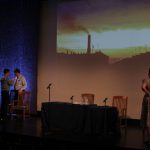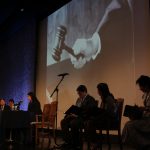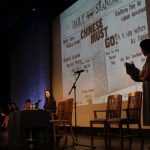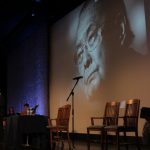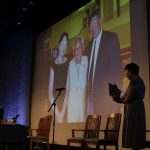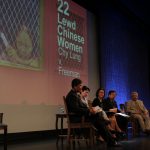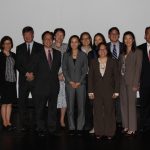On Saturday, May 16, AABANY’s trial re-enactment team, led by Hon. Denny Chin and Kathy Hirata Chin, performed again at the New-York Historical Society, this time re-enacting the Heart Mountain Draft Resisters case.
Before an audience of more than 100 on a Saturday morning, the team presented a slightly truncated version of the script. The Heart Mountain case tells the story of Japanese American internees at Heart Mountain, Wyoming who refused to sign up for the draft to protest the removal of Japanese American citizens from their homes without due process during World War II.
The performance was followed by a discussion moderated by Judge Chin, in which Kathy Hirata Chin, Hon. Kiyo Matsumoto, Vincent Chang and David Weinberg took part.
Kathy Chin, herself the daughter of a Japanese American father who served in the military, shared her recollections from her own family about the Heart Mountain draft resisters. She believed that her father would not have approved of this re-enactment, given his military background and his views about draft dodgers. Kathy noted that her brother did see this re-enactment performed on a previous occasion, and he, like her, saw the draft resisters in a different light after learning more about the cases.
Judge Matsumoto’s family was interned during the war, and she recalled that it was not a subject that was discussed much at home while she was growing up.
During the question-and-answer portion of the program, many audience members took the opportunity to pose questions to the panel. Many high school and college students were in the audience, and the last question went to a high school student who asked what happened to the internees once they were released and went back to their lives. The harsh truth was that most of the internees lost their homes and had no jobs to go back to. Yet, many of the internees were able to put their lives back together, and as reported recently in The New York Times, there were instances of kindness exhibited by white and Chinese neighbors of internees who bought their homes and maintained them and re-sold the homes back to the internees after they were released.
AABANY thanks the New-York Historical Society for allowing us to share the history of Asian Americans that would otherwise go unnoticed, especially during APA Heritage Month, with a wider and highly engaged audience.
To learn more about this trial re-enactment contact AABANY’s Executive Director, Yang Chen at yang.chen@aabany.org. The scripts for the first five
re-enactments can be found online at the AABANY Law Review website.


